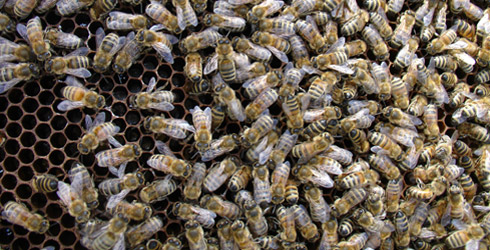Co-production: all in this together
Ruth Dineen
In the last issue of Networks we congratulated the three successful National Teaching Fellows working in art, design and media disciplines. In this issue one of the Fellows, Ruth Dineen, Learning and Teaching Associate at University of Wales Institute, Cardiff, tells us about her background, philosophy and plans for the future. Concerned about the frequently negative effects of formal ass...

In the last issue of Networks we congratulated the three successful National Teaching Fellows working in art, design and media disciplines. In this issue one of the Fellows, Ruth Dineen, Learning and Teaching Associate at University of Wales Institute, Cardiff, tells us about her background, philosophy and plans for the future. We look forward to hearing from the other Fellows over the coming months. For further details of the scheme, and profiles of the Fellows visit: www.heacademy.ac.uk/news/detail/2011/ntfs_awards
Co-production: all in this together
Concerned about the frequently negative effects of formal assessment processes, I recently undertook an action-research project into assessment and motivation with my colleague Annie Grove White. We did the usual things, questionnaires / action / more questionnaires / modified action / and more questionnaires. Having used up a small forest in pursuit of a solution to the problem, and having entirely bewildered ourselves with the mystery that is SPSS analysis, our final feedback session was delightfully simple: a discussion group of seven of the 50 students who had been the focus of the project.
The session took about an hour, although it probably could have gone on all day given the enthusiasm of the volunteer students. We occasionally chipped in with questions but the discussion soon took on a life of its own as the students themselves became increasingly engaged with the problem. At that point I began to realise that the students knew much more about the negative effects of assessment than I did; their insights had been gained through almost three years on our degree programme and from 12 years of formal education before that. And they were coming up with solutions, at first tentatively, and then with increasing confidence.
It was clear that both the trees and my brain would have been saved had we simply asked the students to work with us to co-create a more effective and motivating assessment scheme.
I am more than a little disturbed that it has taken so long for the penny to drop.
I started lecturing in higher education several aeons ago when I still had a waist, when computers were the size of houses, and when staff almost outnumbered students. I pride myself on my democratic credentials, on my willingness to listen to other points of view, my good relationship with students. My teaching and my research are based on a belief that the capacity for innovation and creative problem-solving is an innately human trait. I considered myself fully signed up to the students-as-partners initiative. And yet I had spent decades more-or-less ignoring the communal wealth of understanding and experiential knowledge that our students represent. Of course I would consult, and would modify projects and systems on the basis of feedback. But essentially I continued to hand down pedagogic solutions from on high. And I was the one who decided what the problems and priorities were. I functioned as a benign, generally well-meaning autocrat. Despite the benefits of this form of leadership (particularly to the autocrat concerned!), it was clear that I was missing out on significant insights, and overlooking a readily-available source of sustainable and appropriate solutions.
With exquisite good timing and serendipity, this Pauline conversion to community engagement was reinforced through three, otherwise unconnected, events.
I joined PublicUniversity.org where, among other delights, I discovered Humboldt’s ideal of the university as a radical and transformative community engaged in the search for truth, and where I took part in a survey responding to the question: ‘what should a university contain?’ At the number one slot was the following response: ‘a social place where sharing & developing knowledge & understanding goes hands in hand with friendship’.
Then I attended an action-learning course, a powerful approach to problem-solving predicated on careful listening, non-directed questioning, and communal wisdom.
And finally, I was introduced to the concepts of the core-economy and co-production. The term core-economy refers to relationships of reciprocity and exchange that underpin communities and to the estimated 40% of (unpaid) economic activity that takes place within those communities. In the words of Edgar Cahn, the originator of the co-production approach: ‘What does this core economy do? What does any economy do? It produces and it distributes. What does [it] produce and distribute? Infants. Children, teenagers and peer groups, families, care for seniors. Safe, vibrant neighbourhoods, community, democracy, civil society. Love and caring and coming to each other’s rescue 24/7.’
When the core economy breaks down the community ceases to exist and Thatcher’s chilling assertion that ‘there is no such thing as society’ prevails. Individuals are left to sink or swim, falling through the increasingly large gaps in the welfare state.
Cahn’s solution is to rebuild the core economy by ‘valuing all human capacity, honouring all contributions, generating reciprocity’ and restoring social networks. These are the principles of co-production, a method of delivering services which ‘enlists those being helped as partners, co-workers and co-producers of the intended outcomes’. The particular advantage of a co-production approach is in its utilisation of the knowledge and skills of all participants. This moves people from dependency and passivity to empowerment and contribution, building confidence, peer-networks and a sense of shared responsibility. And these changes have a powerful effect on participants’ sense of well-being. It’s something of a holy grail!
To date, the co-production approach has been marginal to education, although there are some exciting initiatives being undertaken in schools and universities, such as the Learning to Lead project initiated by Wells Blue School, and the Students as Agents of Change in Exeter University. However, the market-led context of UK higher education might, ironically, prove to be an ideal nursery for the co-production ethos. With the university redefined in terms of a 'purely economic calculation of value and a wholly individualist conception of ‘consumer satisfaction’ (Collini, 2010), higher education’s core economy looks increasingly fragile. We are rapidly moving away from Humboldt’s community of scholars, and PublicUniversity’s ‘social place’ of sharing and friendship. In the face of this reductive hegemony, co-production could help us reassert the primacy of partnership, reciprocity and mutual responsibility, the significance of the community, within and beyond the university.
My co-production research project has only just started, and I am way out of my comfort zone, but as I learn more it becomes clear that the co-production approach can be utilised as an educational strategy in its own right, a high-impact version of the ‘students as partners’ initiative. Co-production offers an antidote to passivity, alienation and disillusion. Its use:
- offers a participative and contextualised learning opportunity
- develops a sense of community and independent peer-networks
- promotes deep learning and active engagement
- encourages inclusivity and reciprocity
- builds confidence and capacity
- produces new knowledge.
This approach prioritises ‘the need to develop our citizens as human beings, alive to themselves, to each other and to the world in which we live’… ‘attentive, celebratory and able to sing’. (Danvers, 2003) I can’t imagine a more inspiring aspiration - for our students and ourselves.
Biography
Ruth Dineen is a Teaching & Learning Associate at UWIC and was previously Head of the Department of Creative Communications in Cardiff School of Art & Design. She has a particular interest in creative pedagogy, student motivation, and assessment for learning. Ruth is currently using her NTF award to look at the possibility of co-producing a cross-sector co-production toolkit for practitioners. She is on a steep learning-curve!
References
Collini, S. (2010) ‘Browne’s Gamble’ in London Review of Books, v32 n21, pp23-25.
Danvers, J. (2003) ‘Stuttering at the Owl: Poetic Displacements & Emancipatory Learning’. paper presented at the conference: Discourse Power Resistance - new directions, new moves. University of Plymouth, UK. April 2003.
For more information about co-production see:
Cahn, E. (2000) No more throwaway people: the co-production imperative, Essential Books, Washington.
New Economics Foundation (2009) Co-production: a manifesto for growing the core economy, the new economics foundation, London.
Boyle, D. et al (2010) Right here, right now. Taking co-production in to the mainstream, NESTA, London.
Slay, J. & Robinson, B. (2011) In this together: building knowledge of co-production, the new economics foundation, London.
Header and listing photo: sourced from morgueFile.com


